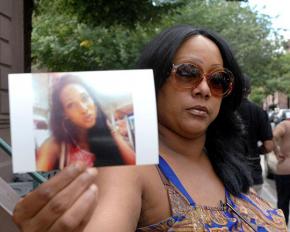Justice for Islan Nettles
Owen Meehan, a trans* person living in New York City, and Ken Myers report on the response to the murder of a 21-year-old trans* woman of color in Harlem.
HUNDREDS GATHERED at Jackie Robinson Park in Harlem on August 27 for a vigil to mourn the death of Islan Nettles, a trans*gender woman of color. The event, organized primarily by the New York Anti-Violence Project (AVP) and Harlem Pride, came 10 days after a man beat and hurled trans*phobic slurs at Nettles just one block away from the police station.
Nettles was transported to Harlem Hospital where she slipped into a coma and survived on life support for a short time, but was ultimately declared brain dead. She was 21 years old.
Speakers at the vigil included members of Islan Nettles' family--among them, her mother, sister and uncle--local pastors and ministers, two singers, local LGBTQ community leaders, and trans*gender actress Laverne Cox.
Many of the speakers called for peace, reflection, respect and an understanding that the gathering wasn't a "political" rally, but a vigil. Notably, only two of the speakers were trans*gender--actress Laverne Cox and the AVP's Chanel Lopez--and many of the speakers (including some family members) referred to Islan by the wrong gender or used her old name, which some vigil attendees attempted to correct. Cox made note of this in her speech, saying, "I hear lots of people out there who are upset because she's been called by the wrong pronoun. It hurts me too."

A diverse crowd turned out for the vigil, including three mayoral candidates, trans*gender author and activist Kate Bornstein, trans*gender writer and activist Janet Mock, and many others from around New York City.
Staten Island resident and trans* man Marty Hernandez Avedon explained why he was there:
It's really sad that this happened. It's really frightening what it's like out there for trans* women. People try to pump up New York City as being this super progressive place and it's really not.
I want people to be safe to be who they are and not have to worry about [how] some guy is going to catcall them and once they figure out that you're trans* they're going to bash your head in.
New York Amsterdam News writer Tamerra Griffin said:
LGBT [people] and people of color are facing lots of violence...it's unfortunate that it takes these kinds of incidents [such as the killing of Islan Nettles] to make these vigils happen.
The first step any time you are trying to eradicate social injustice is that we need to talk about it--even if there's discomfort in talking about it. And we need to be speaking with people outside of the community as well.
SO WHY weren't attendees at the vigil, particularly trans*gender women of color, given the opportunity to talk about the outrage they were feeling about the tragic death of yet another trans*gender woman of color? Why were they shamed, silenced and deemed disrespectful for attempting to ensure Islan's correct pronoun and name were used?
This is a question author and activist Janet Mock asked in a recent blog post:
We were told this vigil was focused on Islan's family versus "political" issues like "transphobia"--as if the personal and political can be separated so effortlessly and cleanly.
We are still vulnerable--just as Islan was--and that is not a political issue. That is truth, a truth that we are reminded of every time we step out of the comfort of our homes and are called out of our names, identities and bodies on our streets. And the organizers frankly ignored our truth and that pain paired with the grieving of a sister beaten to death at the tender age of 21 is unbearable.
This truth is undeniable. A recent report reveals that of the 25 documented anti-lesbian, gay, bisexual, trans*gender and queer (LGBTQ) homicides that occurred in 2012, 53 percent were trans*gender women. The report also cites 73 percent of all anti-LGBTQ homicide victims are people of color. An older statistic estimates that trans* people are victims of 20 percent of all murders and 40 percent of all police-initiated violence.
It is clear that trans*gender women of color continue to face hugely disproportionate rates of violence in our communities, yet they continue to lack the platforms and resources to be able to organize against the racist and trans*phobic system that perpetuates the violence.
While these statistics are alarming, they're even higher if you take into account those acts of violence against trans*gender women of color who go undocumented or are incorrectly documented due to the pervasive trans*phobia that exists within the criminal justice system.
When vigil organizers decided to leave out trans*gender speakers from the program and tried to stop those who spoke out against the misgendering of Islan from the platform, they failed to take on the silence about violence against trans*gender women of color and the trans*phobia, which contributed to Islan's death.
As important as this vigil was in providing much needed healing for the family, it shouldn't be the end of the action we take as a result of Islan Nettles' needless death.
Rather, the vigil should serve as yet another call to broader action and further examination of the dialogues happening within our own communities. We should take it as a reminder of the importance in providing space for trans* women of color to speak out in hopes of preventing further atrocities like the brutal death of Islan Nettles.
Note: The asterisk used throughout this article is there to acknowledge that the community of people who fall outside the category of cisgender is broader than those who identify as the binary gender they were not assigned at birth (trans* men and trans* women), and includes people who identify outside of the gender they were assigned at birth and do not identify as "transgender" in its traditional meaning.


